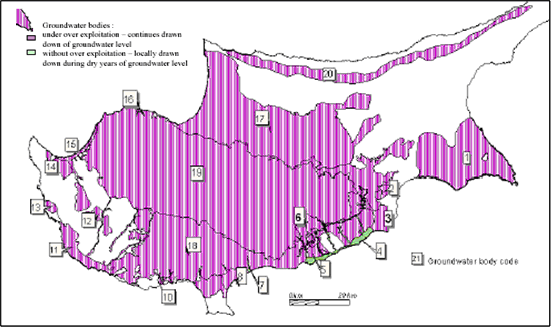Illegal borehole drilling and over-pumping is a major issue, especially in the South-Eastern part of the island, where groundwater reserves are low, but income from potato production is high. The continuous over-pumping of aquifer reserves to meet water requirements for sustaining agriculture during the prolonged drought of 1996-2000 has resulted to their depletion and significant sea intrusion in coastal aquifers, has diminished of available reserves and has reduced the yield of wells. Additionally, the extensive construction of big surface reservoirs has exacerbated the problem, as the natural recharge to the coastal aquifers has been reduced, without being followed by an equal reduction of pumping.
The present level of abstraction in Cyprus is around 130 hm3/yr while the total recommended abstraction is estimated at 80 hm3/yr at the most. As a result, during the past decade, almost all groundwater bodies, except for riverbed coastal ones are being overexploited.

Overexploited groundwater bodies
The majority of groundwater bodies experiences a substantial reduction in the yield of wells, which in some cases is of the order of 1/10th of the yield during the previous decade. This is the case for the Kokkinochoria aquifer (Aquifer 1 of above Figure), where approximately some 5000 boreholes are in operation today. The yield of those boreholes has been reduced from the average of 10 m3/h in 1980 to 1-2 m3/h in 2000. During the decade 1991-2000, the average yield of boreholes used for domestic water supply is estimated to be approximately 25 hm3/yr. However, in the past few years there has been a reduction of the order of 5-7 hm3/yr, with the yield reaching a level of 18 – 20 hm3 /yr.